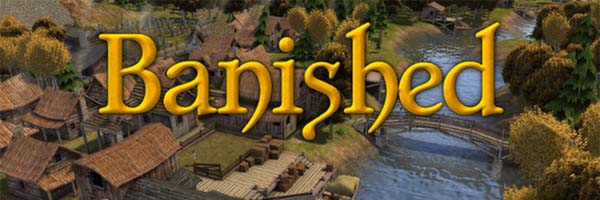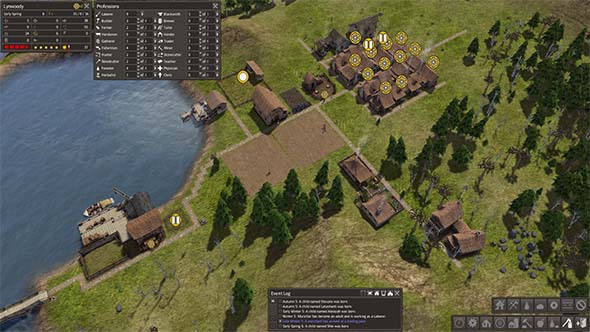As is the case with many kids who grew up in the 80's and 90's, I played many hours of Oregon Trail in the computer labs in elementary school. Some teachers even had to limit how many hours students could spend on that game, so as to make sure we were also playing the other math and language games available.
Now there is a tabletop card game adaptation of the original computer game. It's exclusively available at Target ... and apparently also on Amazon. It retails at $15, but I always seem to see it on sale for $10 or $12. So it's an inexpensive little game.
My seven-year-old proxy-daughter picked out this game for me as a birthday gift. She recognized it from the TV show Teen Titans Go!, which has an episode in which the characters act out the original computer game (and all die, of course). When I asked her what the Oregon Trail is, she responded "Everyone got dysentery.". So I asked if she knows what dysentery is, and she responded "It's where you poop to death." I guess the show has some educational value after all...
More an emergent narrative than an actual game
The game is simple to play. Each player is given a hand of trail cards and supply cards, and there's a stack of "Calamity Cards" that serve as the main challenge for the game. Players take turns playing a trail card from their hand or a supply card. The selected card's trail end must match up with the end point of the trail on the previous card in order for the card to be played. Most trail cards will require some kind of resolution. Some are river fording cards that require the player to roll a die in order to allow the party to proceed past the river or suffer penalties. Some are calamities that require drawing a card from the calamity deck and resolving its effects.
Most calamities can be countered with supply cards, but snake bites and dysentery are instant, unavoidable deaths.
Most calamities are unfortunate effects that require a die roll or a specific supply card to be played. If the effect is not resolved in time, a penalty occurs -- usually the death of the affected player. Some calamity cards (such as the snake bite or ubiquitous dysentery) will even kill a player outright, with no chance to avoid death.
The objective of the game is for the party to successfully pass 50 trail cards to travel from Independence, Missouri to Willamette Valley, Oregon. It's a purely cooperative game, so if any one surviving party member makes it to Oregon, then the entire group (including the dead players) wins the game.
[More]
65386274-7868-482c-812c-58c6189114e8|0|.0
Tags:Oregon Trail, history, dysentery, cholera, death, wagon, wagon train, Target, board game, card game, Independence, Missouri, Willamette Valley, Oregon, computer game, Teen Titans Go!, Tales of the Arabian Nights, nostalgia

In between games of Madden 17, I need something to tide me over until the release of Civilization VI consumes my life at the end of October. As such, I did what I usually do in these situations, and I dove into my Steam backlog to look for something that's been sitting around, unplayed, for a couple years. Usually, I try to find some short games like This War of Mine or Papers, Please. I try to avoid the bigger games because they can end up consuming more of my time than I want them to, and if I jump to something else, then I may not go back to such a game to give it a fair chance. Sorry, Master of Orion, Endless Legend, and Endless Space 2, you'll all have to wait until after my upcoming Civ VI bender before I can give any of you a fair chance. That being said, I decided to take a risk and try out a city-builder that I've had sitting around for awhile. I love city-builders, and so this could easily have dragged on for weeks or months, but I hoped that the narrow scope of this game would mean that it wouldn't take as long to get my fill of it.
Banished is a game that offers unforgiving tough love. I feel like this game is the "Oregon Trail" of city-builders, and it's enjoyable as a challenging game of resource management. Unfortunately, it isn't exactly the best at explaining itself, and so it requires a lot of trial and error in order to get going. There's a lot of cycles of cascading success or failure, so you'll likely be restarting your games multiple times before you get anything remotely close to a sizable village. I would also advise that you try to keep multiple save states for your early cities so that if you make a small mistake that starts to spiral into catastrophe, you can reload and fix it without having to restart the entire game.
The tutorial explains a lot of the basic functionality of the buildings, but it never really addresses how to get the most out of these buildings. This results in an unnecessarily high learning curve and bar of entry as you try to stumble upon the optimal placements and uses of buildings. I kept making little mistakes that had big repercussions that forced me into restarting my very first game multiple times - even going so far as to save the random map seed so that I could restart in the same map and try different approaches to some things.

I had to iterate through some sub-optimal building placements before stumbling upon a viable city.
An example of a small misstep that crippled a game was that I built a farm that overlapped slightly with a single tree in one corner. Normally, farms are created as soon as you finish zoning them, and you simply have to select which crop to plant and assign workers to work it. But if there are any rocks or trees, then you must first remove them in order for the farm field to be built (like with any other building). So while I waited for some laborers to come chop down the trees (uncertain why nobody was bothering to cut down that one fracking tree!) spring passed and the window for planting closed. So the farm went un-used for the rest of the year, I had no crops saved up, and several adults and children died, leaving my village under-staffed for the following year. So I restarted and placed my farm entirely in an open field, planted during the first spring, and collected a healthy reserve of wheat to keep all my villagers fed through the winter...
[More]
f4887e6d-007a-43fa-9a02-db5781c5c44b|1|5.0
Tags:Banished, Shining Rock Software, Steam, indie gaming, city simulation, simulation, strategy, survival, medieval, renaissance, agriculture, farming, resource management, food, minerals, roads, seasons, winter, Oregon Trail